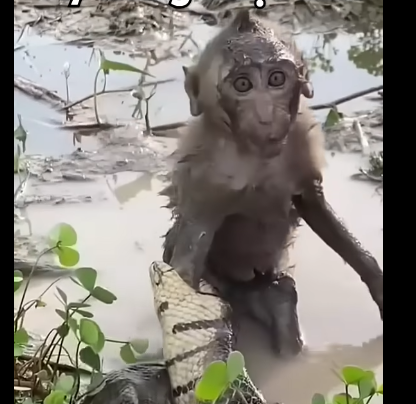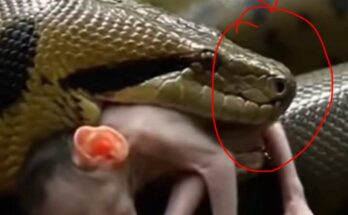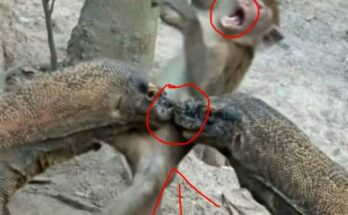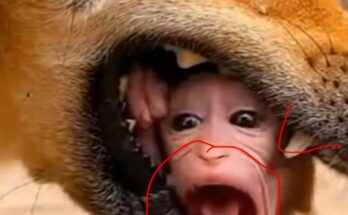
In the dense heart of the rainforest, where every branch was a highway and every leaf held life, a baby monkey clung to the bark of a tree, trembling. He was smaller than the others, thinner too, but what made him stand out most was painfully clear — he had no hands.
Born with deformed limbs, the baby monkey struggled each day just to hold on. While his siblings swung freely through the canopy, grabbing fruit and playing games high in the trees, he remained close to the base of the trunk, gripping with his feet and relying on his chin or elbows to steady himself.
He didn’t have a name, not in the way humans use names, but to the other monkeys, he was simply “the little one.” His mother had once watched over him closely, carrying him gently, feeding him, protecting him from the dangers of the jungle. But one day, she went searching for food and never returned.
Some said they heard the cries of a predator — a leopard maybe, or a boa — deep in the night. Others whispered that she had been wounded and wandered off, too weak to come back. Whatever the truth, the little one was left alone.
Alone — and helpless.
He couldn’t forage like the others. He couldn’t cling tightly to branches or leap across gaps. He couldn’t even defend himself from curious birds who pecked too closely. And yet, somehow, he survived.
The troop moved as it always did, following the seasons and the fruit. Most of the monkeys ignored the baby or kept their distance, unsure how to help him. A few elder females brought him bits of food now and then — a berry, a piece of leaf — but never enough to truly nourish him. He wasn’t rejected, not completely, but neither was he accepted as one of the strong.
Still, the baby monkey endured. He found ways to hold fruit by pressing it between his arms. He learned to drink from dew-soaked leaves by tilting his body just right. And he would always stay low, never venturing high where one slip could be fatal.
One afternoon, as the troop rested in the shade, a loud rustling startled the group. A young male monkey, rowdy and full of pride, had thrown a fruit too close to the baby’s face. It hit him with a thud, and he fell backward, barely catching himself on a root. A hush fell over the troop. The baby didn’t cry. He simply looked at them, wide-eyed, unsure if this was a game or something worse.
Then, something unexpected happened.
An older monkey — a grandmother of the troop — walked slowly toward him. She gently brushed the dirt off his back and sat beside him. For the rest of the day, she stayed close. That night, she let him curl up beside her.
From then on, others slowly followed. A young female let him share her fruit. A playful juvenile invited him into a slow, gentle game of tag. The troop never quite treated him as normal — because he wasn’t. But they began to accept that he still belonged.
He may never swing like the others or grab fruit with ease. He may never know what truly happened to his mother. But in his small, quiet way, he reminded the forest — and those who watched from afar — that strength isn’t always measured by what we can do with our hands, but by what we can survive without them.


